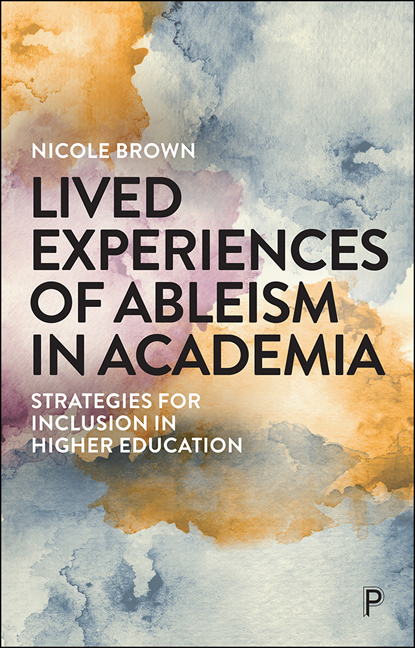4 - What’s in a word? Rephrasing and reframing disability
Published online by Cambridge University Press: 18 December 2021
Summary
Introduction
Academia is directed by policy and government legislation when managing students and, as such, the requirements of the Equality Act 2010 to meet the accessibility needs of disabled students are fulfilled. We can see, however, that even within society the inequalities and needs of individuals are not always met (Smith, 2017). Alongside this sits the discussion about the terminology we use and how that impacts on the social construct of disability.
By exploring some of the historical perspectives and definitions that have emerged, and in considering society's construct of disability through the influences of media and language, I argue that we need to develop a more inclusive approach that exceeds the policy requirements and develops a ‘value’ approach to meeting individual needs.
A personal perspective
I encountered a period of life-threatening illness in 2003, my approach to which was a positive one. The ‘big C’ word was a negative term in 2003, and my cancer treatment was invasive and followed by chemotherapy. At that time cancer was not classed as a disability; it became defined as such under the Equality Act 2010. Cancer can be defined as a ‘hidden disability’ as, although the signs are often evident during chemotherapy, the lasting effect of chemo continues unseen for many years afterwards with many side effects, such as neuropathy (The National Cancer Institute, 2010) and immune deficiencies. During recovery I was supported well; however, trying to return to work during the last cycle of chemotherapy was a challenge. I felt very strongly that returning to work would enable a more positive mental wellbeing. I acknowledge that the well-meaning gestures from colleagues and friends were for my own care but, on reflection, I remember the level of their knowledge and understanding was limited and misjudged. In identifying this response, it becomes apparent that many disabilities are misunderstood and the lack of understanding and awareness results in discrimination. Brown and Leigh recognise that there is a distance between policy and practice. They state that many academics with disabilities are not taken seriously, and that their professional status is seen ‘through the lens of their disability status’ and that this can result in the ‘fear that they are suddenly no longer seen as academics or persons, but as their disability or health condition’ (Brown and Leigh, 2018: 987).
- Type
- Chapter
- Information
- Lived Experiences of Ableism in AcademiaStrategies for Inclusion in Higher Education, pp. 73 - 90Publisher: Bristol University PressPrint publication year: 2021



